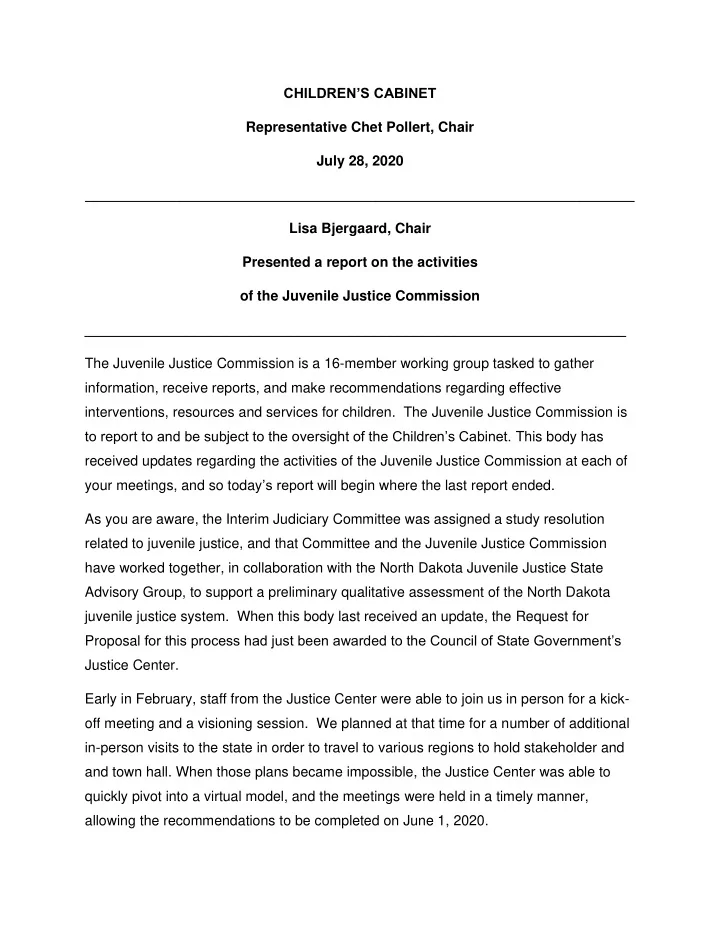

CHILDREN’S CABINET Representative Chet Pollert, Chair July 28, 2020 ______________________________________________________________________ Lisa Bjergaard, Chair Presented a report on the activities of the Juvenile Justice Commission _____________________________________________________________________ The Juvenile Justice Commission is a 16-member working group tasked to gather information, receive reports, and make recommendations regarding effective interventions, resources and services for children. The Juvenile Justice Commission is to report to and be subject to the oversight of the Children’s Cabinet. This body has received updates regarding the activities of the Juvenile Justice Commission at each of your meetings, and so today ’s report will begin where the last report ended. As you are aware, the Interim Judiciary Committee was assigned a study resolution related to juvenile justice, and that Committee and the Juvenile Justice Commission have worked together, in collaboration with the North Dakota Juvenile Justice State Advisory Group, to support a preliminary qualitative assessment of the North Dakota juvenile justice system. When this body last received an update, the Request for Proposal for this process had just been awarded to the Council of State Government’s Justice Center. Early in February, staff from the Justice Center were able to join us in person for a kick- off meeting and a visioning session. We planned at that time for a number of additional in-person visits to the state in order to travel to various regions to hold stakeholder and and town hall. When those plans became impossible, the Justice Center was able to quickly pivot into a virtual model, and the meetings were held in a timely manner, allowing the recommendations to be completed on June 1, 2020.
The Juvenile Justice Commission met on June 17 to receive the report and participate in a discussion with Josh Weber, who directs the juvenile justice program for the Justice Center, and who lead the assessment effort. The full document has been linked to your agenda. The qualitative assessment identified four primary overarching opportunities for us to align system policies, practices and funding with research and best practices, and they are as follows: 1. Decriminalize unruly behaviors and develop pathways to serve these youth outside of the justice system. 2. Establish more stringent criteria and research-based processes for system decisions, particularly detention and out-of-home placements. 3. Invest limited resources into building a more robust continuum of community- based services statewide as well as for specific populations and communities. 4. Strengthen statewide commitment to and capacity for evidence-based services, quality assurance, and data collection. Mr. Weber and colleagues recognize that many of these broad system recommendations, as well as the specific statutory recommendations, might require additional resources in order to implement with fidelity and high quality. Therefore, the Justice Center advises proceeding by way of an extensive and structured implementation process that can serve to create buy-in, collaboration, and support. They suggest care be taken to assess potential benefits, resource requirements and time frames for each recommendation and prioritize system changes accordingly. The Interim Judiciary Committee expressed desire to move forward with the statutory recommendations, recognizing that a modernized juvenile court act will serve as a foundation for further juvenile justice reform efforts. The Juvenile Justice Commission committed to working with the Interim Judiciary Committee in order to capitalize on the efficiencies that come with working together. The Commission moved to create a small workgroup comprised of legislators and practitioners who were charged with writing the first draft of a bill that would incorporate the Justice Center recommendations.
The workgroup included legislators Representative Klemin, Senator Diane Larson, Senator Bakke, and Representative K. Koppelman. In addition, the group included Juvenile Court Director Karen Kringlie, Director of Children and Family Services Cory Pedersen, ND Juvenile Justice Specialist Lisa Jahner, Director of Indigent Defense Travis Finck, and Director of Juvenile Services Lisa Bjergaard. Using N.D.C.C. 27-20 as a starting point, the group worked to incorporate the recommendations of the Justice Center. The broad aims of the work group were to outline a general juvenile court act, separate the response to delinquent children, and develop a response for children needing protection and those children and families who are in need of services (formerly those youth who are unruly). Thus, the structure of the draft included the creation of a new juvenile court act, a child welfare chapter, a juvenile delinquency chapter, and continued the chapter regarding guardianship. The existing Uniform Juvenile Court Act would be repealed. The first draft of the bill has been attached to your agenda. The workgroup submitted their draft work to Representative Klemin, chair of the Interim Judicial Committee, on July 1, 2020. Representative Klemin passed the work along to Legislative Council for bill drafting. A first version of the bill was completed on July 20, and the bill draft was introduced to the Interim Judiciary Committee on July 22, 2020. Chairman Klemin directed that the Committee would accept written comments regarding the proposed bill draft until August 5, 2020. Between August 5 th and early September, a small group will convene to rework the bill and consider any comments for inclusion. The bill draft will be resubmitted to Legislative Council for final drafting. A finalized draft will be presented to the Interim Committee for final approval at the September 24 th meeting. The JJC agreed to continue to hold regular meetings in order to provide further opportunities for stakeholders and other affected groups to provide feedback and offer their inputs to the process. The next meeting of the JJC is scheduled for August 17, from 9 am to 12 pm, and will convene via Microsoft TEAMS.
Recommend
More recommend